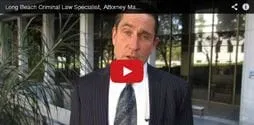New Criminal Laws in california for 2022
Police gangs are now prohibited but nunchucks aren’t. New criminal laws in 2022 continued the liberalization of sentencing laws, restrictions on police conduct, and the recognition of the effects of youth and prior victimization as a cause of anti-social behavior. Police officers must be at least 21 years old and agencies may not authorize techniques that can cause positional asphyxia. Felony probationers accused of a violation are entitled to an O.R. release pending a hearing absent clear and convincing evidence of the need for incarceration. What follows is a brief overview of new criminal laws in California in 2022 by Long Beach criminal law attorney, Matthew Kaestner.
DEFENSES AVAILABLE TO CERTAIN VICTIMS
It is now a defense to all but violent felonies that a defendant was coerced to commit the crime as the direct result of human trafficking under new Penal Code (“P.C.” ) 236.23 or as the direct result of being a victim of sexual or intimate partner violence. (P.C. 236.24) Also, convictions of such victims for non-violent offenses can be set aside upon a petition under new P.C. 236.15.
PLEA BARGAINING–CONSIDERATION OF AGE, CHILDHOOD/SEXUAL/INTIMATE PARTNER VIOLENCE AND OTHER TRAUMA
Under new Penal Code section 1016.7 prosecutors are required to consider psychological, physical and childhood trauma, a person’s youth (under 26 years old) or the fact that an accused was the victim of intimate partner violence or human trafficking when deciding how to resolve a criminal case.
PEACE OFFICERS AND THE USE OF FORCE
Penal Code 13670 now prohibits police officers from joining “law enforcement gangs” defined as a group of officers who identify themselves with any symbol and engage in a pattern of on duty behavior that violates the law or fundamental principles of policing...”
Government Code 7286.5 now prohibits the authorization of any techniques or transport methods that involve any substantial risk of “positional asphyxia.” Police may no longer situate a person in a manner that compresses their airway and reduces the ability to sustain adequate breathing.
Newly hired police officers must be at least 21 years of age. Government Code 1031.4.
SENTENCING
Most felony charges carry three terms, a low, mid and high term. Now high term sentences are permissible only when a jury finds beyond a reasonable doubt or a party stipulates to aggravating circumstances. Otherwise a court “shall” impose no more than the mid-term sentence. Any aggravating circumstances must be found true in a separate proceeding after guilt is found. (P.C. 1170(b)(1), (2)] A court may, however, consider a certified record of prior convictions in determining an appropriate sentence. Finally a court should impose a low term if trauma, youth or victimization contributed to the commission of the offense. [P.C. 1170 (b)( 3), (6)]
Persons convicted of most drug offenses who had prior drug offenses were ineligible for probation under former Health and Safety Code section 11370. Now only persons convicted of drug offenses involving minors who have priors are ineligible for probation, except in unusual cases.
Three year drug priors and one year prison priors (except for sexually violent priors) having previously been repealed are now repealed retroactively. The state prison and county jails are to identify persons serving terms for these priors and notify the court for them to be re-sentenced.
Persons convicted of attempted murder and manslaughter based on either a felony murder theory or on the now defunct natural and probable consequences doctrine may now, like persons convicted of murder, apply to be re-sentenced under amended P.C. 1170.9.
PROCEEDINGS IN ABSENTIA/CELL EXTRACTIONS
Under prior law, an incarcerated person who was refusing to come to court to participate in a preliminary hearing or trial was forcibly extracted. Under new Penal Code sections 1043, 1043.5 and 977, a court may find by “clear and convincing evidence” that a defendant is willfully refusing to come to court and allow his or her attorney to proceed in his or her absence.
GANG ENHANCEMENTS –SEPARATE TRIAL PHASE
Under prior law a gang enhancement was tried at the same time as the underlying charge allowing the prosecutor to introduce evidence about the defendant’s gang membership and the criminality of the gang. Now, under Penal Code section 1109 gang enhancements under Penal Code sections 186.22 (b) and (d) must be tried separately and after guilt of the underlying charge is determined.
The gang enhancement (P.C. 186.22) is now more difficult to prove as vandalism, id theft, and looting are no longer considered gang “predicate” offenses. Also the commission of the predicate gang offense can’t include the charged offense and the benefit of the predicate crimes must have been more than simply “reputational.” Finally a gang must be an “organized organization.”
RELEASE OF PROBATIONERS PENDING VIOLATION HEARING
Prior to 2022, persons on felony probation were typically remanded pending a determination of the truth of any allegations of a violation. Now, under Penal Code sections 1203.2 and 1203.25, unless “flash incarceration” is being used, probationers shall be released on their own recognizance (O.R.) unless the Court finds by “clear and convincing” evidence that incarceration is required to assure future court appearance or public safety.
ELECTION SECURITY AND SAFETY
New laws restrict activities near polling places or other voting stations as well as the placing of fake ballot boxes. Elections Code section 18541 expands prohibited activities within 100 feet of a polling place to now include obstructing ingress, egress, and parking. Also soliciting a vote, speaking to a voter about marking the voter's ballot, or disseminating visible or audible electioneering information in the immediate vicinity of a voter in line to cast a ballot or drop off a ballot is prohibited.
Elections Code section 18568 was also amended to now prohibit “(1) a person who displays a container for the purpose of collecting ballots, with the intent to deceive a voter into casting a ballot in an unofficial ballot box, and (2) a person who directs or solicits a voter to place a ballot in such a container.”
RACIAL JUSTICE AND JURY SELECTION
Code of Civil Procedure section 231.7 prohibits a party in a criminal case from using a peremptory challenge to remove a prospective juror on the basis of the juror’s race, ethnicity, gender, gender identity, sexual orientation, national origin, or religious affiliation—or the perceived membership of the prospective juror in any of those groups. Starting in 2022, many neutral reasons for excusing a juror are now presumed to be unlawful and subject to challenge. The new law allows challenges to the use of a peremptory challenge based on these criteria, and requires the party exercising the peremptory challenge to state race neutral reasons for exercising the peremptory challenge.
Challenges based on the following are presumed invalid:
(1) Expressing a distrust of or having a negative experience with law enforcement or the criminal legal system.
(2) Expressing a belief that law enforcement officers engage in racial profiling or that criminal laws have been enforced in a discriminatory manner.
(3) Having a close relationship with people who have been stopped, arrested, or convicted of a crime.
(4) A prospective juror's neighborhood.
(5) Having a child outside of marriage.
(6) Receiving state benefits.
(7) Not being a native English speaker.
(8) The ability to speak another language.
(9) Dress, attire, or personal appearance.
(10) Employment typically held by a protected group or that serves a protected group.
(11) Lack of employment or underemployment of the prospective juror or their family.
(12) A prospective juror's apparent friendliness with another prospective juror of a protected group.
MISCELLANEOUS
Employers stealing tips or shorting workers on salary can now be punished more seriously. Theft of wages, including “intentional deprivation of wages” or “gratuities,” over $950 from one, or $2,350 from two, over 12 months may be punished as grand theft under new P.C. 487(m)
New P.C. 594.39 makes it a misdemeanor to knowingly approach within 30 feet of someone who is within 100 feet of a vaccination site for the purpose of obstructing, injuring, harassing, intimidating or interfering with the person in or out of a vehicle.
P.C. 25555 was amended to add an additional exception to P.C. 25400, prohibiting carrying a concealed gun. Now it is not a crime to transport a firearm to relinquish it to comply with a gun relinquishment order under Family Code section 6389.
Long Beach criminal attorney, Matthew Kaestner, has been fighting criminal cases for over 35 years. As a board certified specialist in criminal law since 1999, he brings vast experience and expertise to every criminal case he takes. Whether you are accused of a new law for 2022 or a law that’s been on the books for years, invoke your right to remain silent and contact attorney Kaestner immediately. He is available to personally take your call and share his expertise. He can be reached directly at 562-437-0200.




